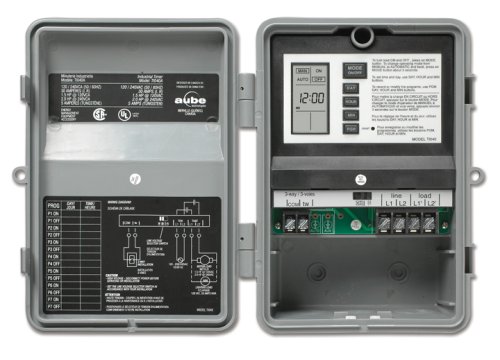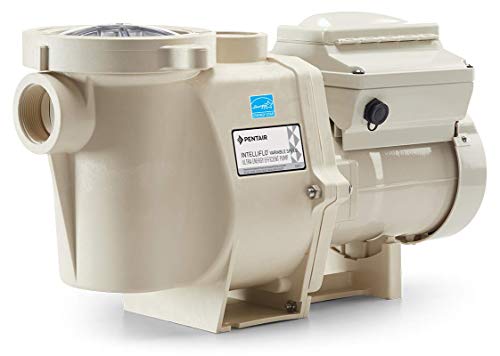How Long Should I Run My Pool Pump Every Day? What’s The Best Time?
DISCLOSURE: As an Amazon Associate, I earn from qualifying purchases.
It seems like an easy question with an obvious answer, does it not?
It shouldn’t be challenging to find out how long to operate a pool pump.
And in reality, it is not.
Before scheduling your pump to run, however, you need to take into account a few factors like your pool’s circulation rate, chemical issues, and cost to run your pump.
Especially the running cost, as this is one of those areas of pool maintenance where getting things wrong will cost you a LOT of money.
The “How Long to Run a Pool Vacuum” Dilemma

The perfect answer is all day, every day, all year.
And then, go find another to pay your electric bill – because it is going to be ridiculously high if you do that.
So while that would be perfect, it is not practical, or even essential.
Why Use A Pool Pump At All?
If the water in your pool didn’t circulate, it would become a stagnant swamp, home to algae and other stuff.
Among the main factors in keeping your pool clean and swimmable is pool circulation.
And circulation is created by your pool pump, which is the first element of your pool’s filtration system.
The pool pump draws water in and then forces it out through the filter.
No matter what sort of filter you own, it only works if water moves through it.
That’s the only way your filter can capture debris and bacteria. Water has to run through the filter system to keep all the water in the pool clear and clean.
The number of pool’s worth of water circulated through your pump in a given timeframe is known as the turnover rate.
How to Calculate Turnover Rate
First, if you don’t already know it, you need to know your pool volume. Or calculate it.
Once you have your pool volume, divide it by 8 to ascertain the number of gallons per hour (GPH), which will have to be pumped.
Most pool pumps work by gallons per minute rather than GPH. To find that number, divide the GPH by 60 to determine how many gallons per minute (GPM) have to get pumped for full turnover.
So your formulae will be:
Total Pool Volume/8 = GPH
GPH/60 = GPM
Choose The Right Pump
This part’s easy- as soon as you have your numbers.
Find one that pumps at least the same GPM as is needed for your pool.
If your new pump can deliver a little more GPM than you need, that’s fine. Just don’t go below your expected GPM. This will ensure that your pump will operate at the appropriate speed to turn over your pool water in one eight-hour period.
Not Just How Long, But When?
Just as important as how long to operate a pool pump is when to run it.
Sure, you will need to run it for a while.
But is that hours? Daylight? Nighttime?
What exactly are we talking about?
Run Your Pump During Non-Peak Utility Hours
Did you know the cost you pay for electricity varies during the day?
The price you pay is based on what electrical providers call peak hours, meaning when more people are using more energy and putting more strain on the grid.
Peak hours vary from location to location.
In warmer climates, peak hours correlate to when people have their air-conditioning turned up – usually in the late afternoon or evening when people are getting home and turning on their A/C.
Call your utility company to learn about your area’s peak hours.
Once you know the peak hours, schedule your pump to run outside of those peak hours to keep your bill lower.
To make this easy, choose a pump with a keeping your pool clean that can switch the pump off and on at the right times.
Sunrise or Sunset?
It might seem logical to have the pump running during the day while swimming in it, so the water remains clean.
And that’s a fantastic thought. But consider a few other things too.
Those non-peak times your utility has maybe at night, mainly if you live in a warm climate where people are more inclined to run their air-conditioning during the day.
Also, after you have added your pool and chemicals, running your pump is necessary.
To get the chemicals entirely dispersed in the water, it has to be circulating. Otherwise, you may be left with pockets of not-so-clean water and super-sanitized spots.
But there’s one chemical that has to be added at night, or dusk: pool shock. If you add it during the day, and the sun will burn most of it, decreasing its effectiveness.
So when you shock your pool, you’ll surely need to run your pump at night, and for a minimum of eight hours to thoroughly distribute the shock.
Non-Consecutive Hours
You need to run your pool pump for at least eight hours every day to complete at least one turnover cycle.
However, that does not mean it must be eight continuous hours.
Again, consider non-peak utility hours.
During those times, you can operate your pump for seven hours there, two hours here, and three hours there.
Once it runs for at least 8 hours in every 24 hours, you’re covered.
Not Just How Long – But What Kind of Pump?
Aside from the non-peak utility hours and time of day, how long to operate a pool pump depends on the kind of pump.
Horsepower
It’s only logical, but it can be something you had not considered. The stronger your pool pump is–, the more horsepower it has – the faster it will turn the water over, which implies you can run it less frequently and for shorter periods.
However, this is dependent on the size of the filter and your pipes of the filtration system.
A pump that is too powerful can be too much for a small filter.
Additionally, a one-horsepower pump will operate more slowly, but if your system has three-inch pipes, it can support a three-horsepower pump, which will run more quickly.
But there’s another problem.
Three horsepower can be too much if you’ve got a small pool, and it will waste energy and cost you more money.
Make sure to find a pump that isn’t too powerful for your filtration system but is strong enough to turn your pool’s volume at a fair rate to catch that magic GPM number you want.
Dual, Single, or Variable Rate
If you have a single-speed pool pump, we suggest that you upgrade to at least a dual-speed. You’ll get a faster turnover and more efficiency. If you’re going to purchase a new pump, we suggest you buy a dual-speed or better.
Besides the energy savings and better efficacy, some states, such as California and Arizona, really prohibit the installation of new single-speed pool pumps.
But to get all the benefits from your investment, we recommend picking a variable-speed pool pump. They help turnover, take less power, and filtering go faster, and you might even have the ability to have a utility rebate for using one.
They also work at lower revolutions per minute (RPM) than dual- and single-speed pumps, so they are quieter.
Variable speed pumps are more expensive, but they are a long-term investment in the efficiency and maintenance of your pool.
Is Your Pool Pump Running All Day? You’d Better Catch It!
Have you been keeping your pool pump run 24/7? Stop the stupidity! You can now look forward to a bill and turn some lights back on.
Or in case you haven’t been operating it enough, you can look forward to a cleaner pool that it’s circulating more often.
And the next time you and your friend discussion how long to operate a pool pump, you’ll be having a useful information.
Now, if you could just make him trim that tree limb, which keeps falling leaves into your pool.
Happy Swimming!












One Response to How Long Should I Run My Pool Pump Every Day? What’s The Best Time?